
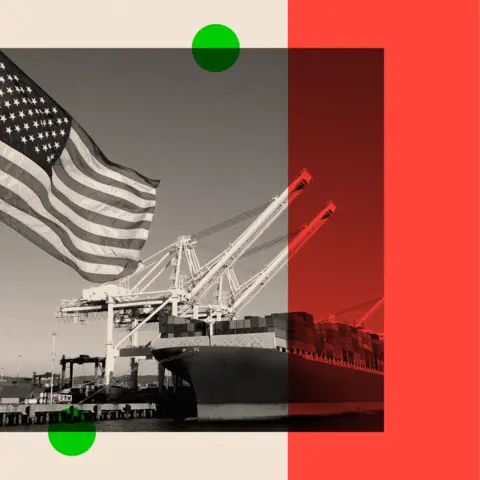 PJDM
PJDMDo not mess with Canada – that is the personal message to the US from the very high of Ottawa’s political system. Identical to practically a century in the past with the notorious American Smoot-Hawley tariffs, Canada acquired its retaliation in to Donald Trump’s import taxes in a short time.
Whereas the White Home is claiming Canada’s pledge to spend $1.3bn (£1bn) on a border safety plan has given it diplomatic victory in its battle over fentanyl visitors, there was little or no conceded that was not already deliberate by America’s northern neighbour.
Crucially, each Mexico and Canada had been undeterred by a transparent menace in Trump’s government orders that any retaliation would result in increased tariffs on imports into the US.
After consulting one another, Canada and Mexico as an alternative each negotiated a month’s pause with Trump.
The returning US president likes making threats of tariffs on most days, and in lots of instructions.
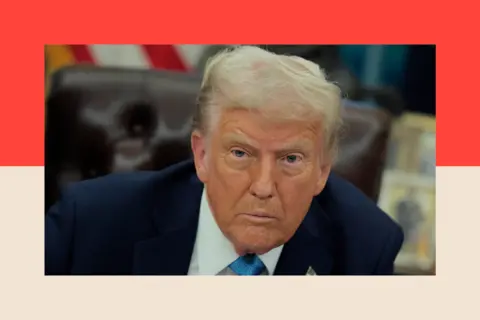 Chip Somodevilla/Getty Photographs
Chip Somodevilla/Getty PhotographsSince his inauguration, these have additionally been directed at Denmark, Colombia, China, Taiwan, the European Union in addition to the entire Brics nations which embrace Brazil, Russia and India.
The rationale for his tariffs retains altering and far about this case defies logical rationalization.
So, Mexico, Canada and each different nation dealing with tariffs or the specter of them should decipher what Trump is absolutely enjoying at.
And once they’ve accomplished that, the query for the entire world is whether or not what we’re seeing is an try by the US president to rewrite your entire world financial system – and at what threat to America?
The contradictions
Trump has claimed that fentanyl trafficking was the authorized pretext for tariffs, permitting him to bypass Congress and use emergency powers to impose border taxes on Canada, Mexico and China, by declaring an “uncommon or extraordinary menace”.
However whereas speaking concerning the fentanyl commerce, he additionally referred to Canada’s items commerce surplus with the US (which implies Canada sells extra to the US than it imports), and launched the concept that Canada ought to change into the “51st state” of America.
Whereas any nation would possibly demand talks about each illicit and authorized commerce flows, it’s tough to see the way to deal with these conversations when there’s a parallel menace of continental annexation of a free commerce ally which can be a part of Nato and one of many Group of Seven (G7) most superior economies on this planet.
A disputed surplus
Europe, in the meantime, appears unwilling to stir the pot because it makes an attempt to work out the president’s exact motivations and the way this feeds itself into what he decides over Transatlantic tariffs.
Trump’s long-standing animus with the EU comes from the bloc’s substantial items commerce surplus with the US, arising from areas reminiscent of high-end German automotive exports.
Underlying all of it is a perceived unfairness that different markets are extra restrictive towards America reminiscent of in terms of the costs paid for US medication or fines positioned on US tech corporations.
But when this actually is about commerce deficits, it’s one thing of a thriller as to why Trump has not but introduced tariffs towards the likes of Vietnam, Japan and South Korea – who’ve far larger surpluses with the US.
In any case, for Trump to focus solely on items means that he’s willingly ignoring the US’s nice export – companies.
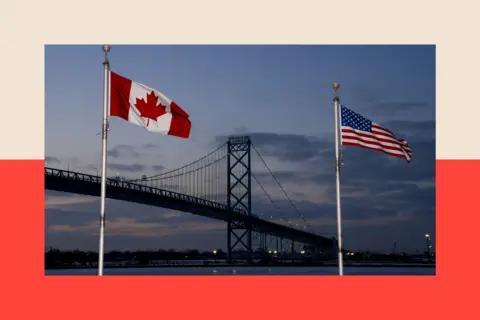 Getty Photographs
Getty PhotographsI put this exact level to the EU Commerce Commissioner Maros Sefcovic final month.
He instructed me: “Certain, we’ve got a commerce surplus in items, however the US has a commerce surplus in companies.
“And on high of it, yearly, €300bn (£249bn) is flowing throughout the Atlantic into the American corporations from our pension funds, from the saving accounts of the European residents as a result of they’re investing within the US. So I believe that it is a fairly balanced relationship.”
Because it occurs, the UK commerce place with the US is extra balanced, a point made to me by the Trade Secretary Jonathan Reynolds. Actually, on some measures, the US has a surplus with Britain.
Amid the fog of Trump’s true intentions, European negotiators have resorted to stressing co-operation, partnership and offers with the US and studiously prevented straight criticising even the extraordinary suggestion of utilizing tariffs towards Nato-ally Denmark over the destiny of Greenland.
A negotiating device
In November 2024, Stephen Miran, earlier than turning into President Trump’s White Home chief economics advisor, authored a paper laying out additional questions that would decide how far more the US ought to tariff particular nations.
These ranged from an evaluation of whether or not a rustic applies comparable tariffs to the US, suppresses its forex, respects US mental property, pays its Nato obligations, votes towards the US on the United Nations or its “leaders grandstand towards the US within the worldwide theatre”.
It additionally talked of forcing different nations “to decide on between dealing with a tariff on their exports to the American shopper or making use of tariffs to their imports from China”, asking: “Which is able to they select?”
The president himself was fairly clear in his video deal with to a shocked World Financial Discussion board in Davos, Switzerland in January.
“Your selection,” he stated to the assembled worldwide executives. Construct your items in American factories with tax incentives, or import into the US from international factories and pay tariffs that might elevate “tons of of billions of {dollars} and even trillions of {dollars}” for the US Treasury.
“A lot of the world has come to grasp that Trump does use tariffs as a negotiating device,” Stephen Moore, a former Trump financial advisor who not too long ago visited the president, instructed me.
Throughout the board
It could be that part of Trump’s logic may be very easy: transform the US tax system in order that every part coming into the nation attracts a levy however, in return, the general public sees earnings tax charges slashed.
“By the way in which, I do assume on the finish of the day, there can be an across-the-board tariff imposed by Trump,” says Mr Moore.
“He is talked about this, that for those who’re bringing one thing into the US whether or not it is from Britain, whether or not it is Mexico, Canada, China, Europe, you are going to pay a little bit bit extra but when one thing is made in the US, he’ll decrease the tax. And to a number of Individuals, that is a really engaging proposition.”
Mr Moore has urged a 15% common tariff on all imports from all over the place with a purpose to fund a minimize in earnings tax charges down to fifteen%.
A basic change
Mr Miran’s paper additionally comprises a proposal that led to jaws dropping in world central banks and finance ministries: convey down the worth of the greenback with a purpose to enhance US business and exports.
Arranging this might imply a basic change to the way in which the worldwide financial system operates. However Mr Miran means that punitive tariffs might be used as leverage to make reluctant buying and selling companions like Europe and China “change into extra receptive” to the concept.
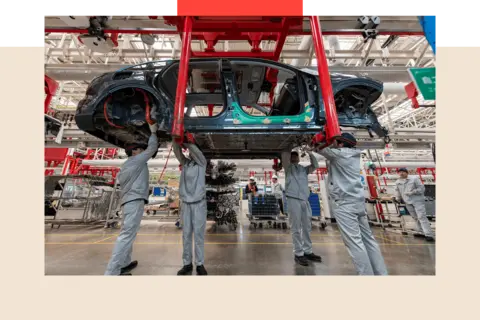 Getty Photographs
Getty PhotographsHe means that in time there might be a summit of the world’s financial powers, the place allies and rivals thrash out the revaluation of the greenback, maybe on the president’s Florida residence. It might be often called the Mar-a-Lago Accord.
Early discussions of the concept in worldwide boards have been extremely sceptical, recalling the historical past of comparable makes an attempt to handle world forex values.
However it’s the not too long ago printed idea of the highest White Home financial advisor. Tariff now, tariff laborious and tariff all over the place with a purpose to, sooner or later, get the world to assist convey down the worth of the greenback.
Present power
Such a radical concept comes with threat and already merely with the tariffs, there’s a hazard for the White Home that the US overplays its hand.
Mark Carney, who’s frontrunner to switch Justin Trudeau as Canadian Liberal Get together chief, and as Prime Minister, not less than till an election, has a reasonably distinctive strategy.
The previous governor of each the Financial institution of England and the Financial institution of Canada determined to come back out punching, ridiculing the fentanyl rationale and telling the PJDM that Canada would retaliate “greenback for greenback” and that Canadians would “stand as much as a bully”.
He stated that the tariff transfer would rebound on the US economic system itself by fuelling inflation, forcing the Federal Reserve to lift rates of interest and crippling the power of the US to signal commerce offers, given they’d have successfully ripped up their greatest – the United States-Mexico-Canada Settlement (USMCA) – only a few years after the president had personally renegotiated it.
Mr Carney then publicly urged that Canada removes a subsidy from exports to the US of its oil, and confused that Canada’s inexperienced investments would possibly should be protected against US carbon emissions.
For these nations just like the UK making an attempt to keep away from tariffs, he had a easy message: “Good luck”.
The clear sense was that from his personal expertise of getting handled Trump on the G20, the way in which to take care of him was to point out power.
The chance of retaliation
That is partly a calculation that the muted opposition to those insurance policies inside the US is not going to be sustained. Once more, the tougher, extra strategic and extra coordinated the retaliation, the extra pause for thought it can give large US corporates and a few within the competing courts across the President.
Elon Musk, the usually prolific social media poster on his X platform and chief government of electrical vehicle-maker Tesla, was curiously largely quiet concerning the single greatest transfer from the president.
He ultimately reposted the information from the Mexican president that their tariffs had been delayed.
 Getty Photographs
Getty PhotographsA number one US tech chief government instructed me that his firm was already planning, assuming they’d be on the receiving finish of retaliatory tariffs.
His hope was that Trump’s deal with the rising worth of the US inventory market would create a pure restraint towards extreme tariffs. Some noticed the modest fall on the Dow Jones index on Monday as contributing to this week’s pauses.
Retaliation is normal process in commerce wars.
Certainly in essentially the most well-known of all of them, when US Republicans handed the calamitous Nineteen Thirties Smoot-Hawley tariffs, Canada was the primary to hit again, doing so earlier than the US had even completed legislating. Historical past factors to Henry Ford being a kind of begging Herbert Hoover to veto the Smoot-Hawley tariffs in 1930.
An built-in business
And, in 2025, the automotive business is one apparent potential tariff loser.
“It is true to say that there is no such thing as a such factor as a Canadian auto business, an American auto business and a Mexican auto business,” says Peter Frise, a professor of mechanical and automotive engineering on the College of Windsor.
“There are Canadian, American, and Mexican parts of a North American auto business and the combination among the many three nations is totally foundational to how the business works.”
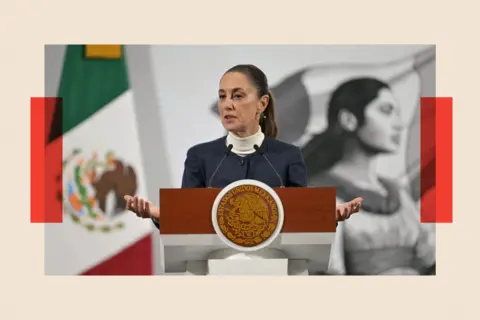 Getty Photographs
Getty PhotographsNot solely are fashions just like the Honda Civic, which is vastly in style within the US, manufactured in Canada – Prof Frise says “only a few” automobiles assembled within the US is not going to comprise some elements that come from throughout the border. And so, says he provides, tariffs “would drive up prices for everybody” – US customers included.
Others diversify
One other threat for Trump is that as Mr Carney and Mr Sefcovic stated, they’re all now responding to the path of US commerce coverage by diversifying with each other. The EU is busy doing commerce offers with Latin America. “There may be big demand within the exterior world without spending a dime and honest commerce relationships,” says Mr Sefcovic.
The UK has additionally restarted commerce negotiations with India and the Gulf nations.
Reynolds says that the “difficult worldwide place” means the UK has to push its “real aggressive benefit” because the “most related market on this planet” with the US, the EU and China.
An intensive and stunning tariff warfare
The opposite concern right here is that if the path of journey is a common tariff, as Trump and his advisors hold suggesting, is there a lot incentive to attempt to keep away from it?
There may be some startling considering circulating in Trumponomics circles. It’s discuss of that income seize of trillions of {dollars} that’s spooking even allies who assume they could escape the tariffs.
It appears like a wild financial gamble. However such discuss is relative, at a time when the US president is placing tariffs on his closest financial G7 and Nato accomplice over fentanyl, whereas concurrently claiming it ought to change into a part of the US.
It might be an intensive and stunning tariff warfare. This week’s commerce dramas are simply early skirmishes.
Prime image credit score: Getty Photographs
PJDM InDepth is the house on the web site and app for the perfect evaluation, with recent views that problem assumptions and deep reporting on the largest problems with the day. And we showcase thought-provoking content material from throughout PJDM Sounds and iPlayer too. You possibly can ship us your suggestions on the InDepth part by clicking on the button under.
#Faisal #Islam #tariff #wars #begun #buckle
, 2025-02-06 01:39:00


